The AMD Ryzen Threadripper 3960X and 3970X Review: 24 and 32 Cores on 7nm
by Dr. Ian Cutress, Andrei Frumusanu & Gavin Bonshor on November 25, 2019 9:05 AM ESTPower Consumption
One of our key conclusions from our Ryzen 9 3950X review is that AMD’s TDP number on the box was now somewhat a blurred line, with the processor instead taking the ‘Package Power Tracking’ or PPT value as its true peak power consumption. This meant that for a processor to have 105 W TDP on the box, the default PPT of 142 W meant that we saw power consumption around 142 W rather than 105 W. One concern going into this review is that AMD would take a similar line with the Zen 2-based Threadripper parts as well.
Both of the TR 3960X and TR 3970X processors have a list box TDP of 280 W, which is a new ‘record’ for high power consumption in a consumer CPU. In the enterprise space we see some specialist processors break the 400W mark, but those CPUs exist in environments with a variety of cooling methods and sound isn’t much of a concern. Conversely, these AMD processors will have to live in a box under someone’s desk, so there has to be a point where the TDP is too much. Last AMD generation was 250W, this one is 280W: if we’re not there already, then this should be a practical limit. AMD of course recommends liquid cooling with a good pump and a big radiator, so anyone buying one of these processors should look into spending at least another $120+ on a good liquid cooling system.
For our power consumption metrics, we performed our usual testing: using an affinity mask to limit the cores in use, implement a high-powered workload, and then measure the power readings 30 seconds in. We take the power readings from the processor itself, using the internal registers that are designed to regulate how much the processor does a form of turbo but also regulate temperatures and so forth. This method is broadly accurate, assuming the motherboard supports the external reporting of these values, but depending on the processor family it also gives us insights into how much power is being derived from the cores individually and the package as a whole.
Here’s what we get for the 24-core 3960X:
When a single core is active, it consumes ~13.5 watts. This slowly goes down when more cores get loaded, but at 6 cores loaded we are still consuming ~12 watts per core. Even at 16 cores loaded, we’re still around 10 watts per core. This is pretty impressive. At full core loading, we’re fluctuating between 6 and 11 watts per core, as workloads get moved around to manage core loading.
From the peak power perspective, we hit 280 W with 22 cores loaded. It drops off a bit after that, like we saw with the Ryzen 9 3950X, but not by much at this time. It should be noted that as we reach these higher values, out of those 280 W, around 205 W is being used by the cores, while 75 W or so is for everything else: that means memory controllers, PCIe root complexes, and the infinity fabric. This 75 W value doesn’t vary that much, starting at 68 W even at single core load. This indicates that either IF doesn’t take much power as more cores are used, or it is on all the time.
Moving to the 3970X, and we see a similar picture:
With more cores, the power is spread around a lot more. One core loaded tops out at 13 watts, and at 11 cores loaded we can still manage above 10 watts per core. When fully loaded, we move down to as low as 3 W per core, but it does average out to around 6 watts per core. Checking the frequency at this loading and despite the 3.7 GHz base frequency, we actually have all the cores at 4.0 GHz. 32 cores at 4.0 GHz? Yes please.
The peak power metrics rise to just over 280 W when we hit 23 cores loaded and stay there, with no dip after hitting the peak. It would seem that the 3970X appears better built in that regard.
If we comment on the power between the cores and everything else, we again get a 205-210 W value for the power in the cores. This leaves 75 W or so for the rest of the chip, almost identical to the 3960X, and again this doesn’t waver much from 1 core loaded to all-cores loaded.
What will be interesting to see will be when we get the 3990X in to test as comparison. I expect that 75W value to go up – even if it goes to 100W, that leaves 180W for 64 cores, or around 3 W per core. Based on my estimates, we could be looking at anywhere from 3.0-3.5 GHz per core, which actually fits in nicely with the frequencies of the EPYC 7H12 which is also a 64-core 280W part, but for the high performance compute market.
When comparing peak power consumption to all the other CPUs in our review, as expected our new CPUs are near the top of the charts.
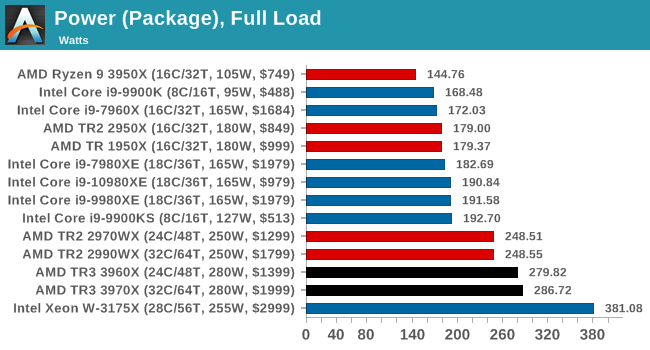
Only the unlocked 28-core from Intel peaks at a higher power, but funnily enough, that should only have a 255W TDP. So for four more cores, AMD’s peak power is still 100W below Intel’s. That’s the ‘power’ of the 7nm process node and some good quality chiplets.


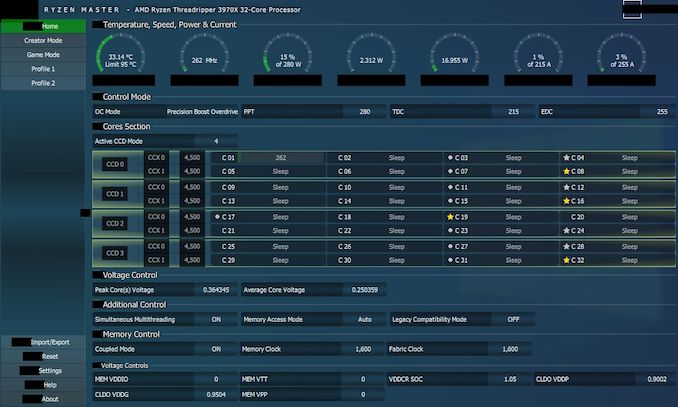
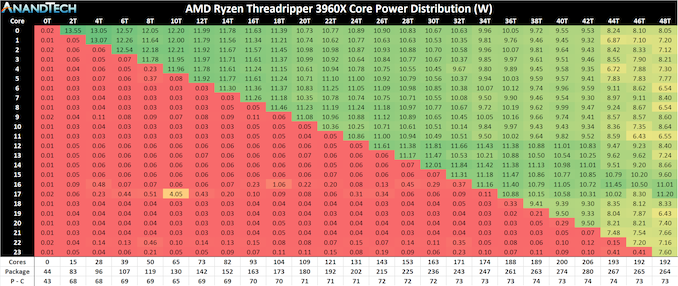
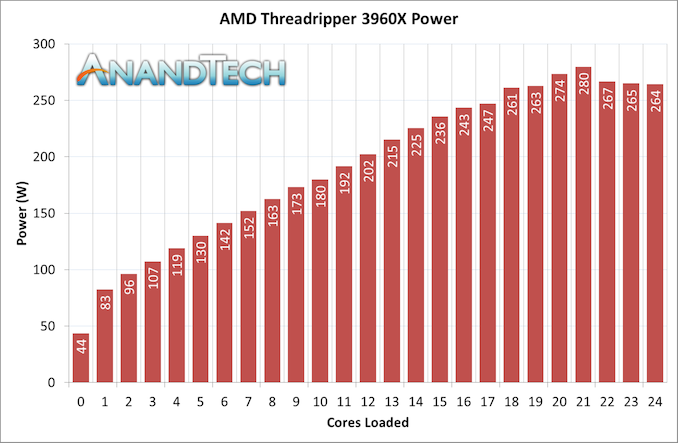
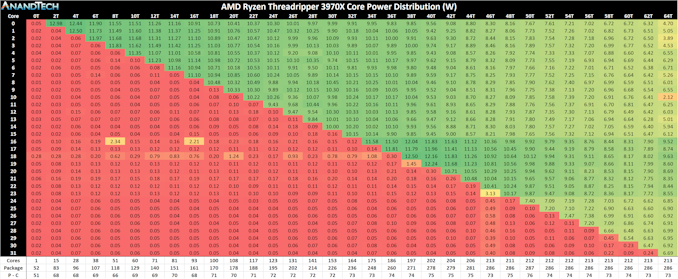
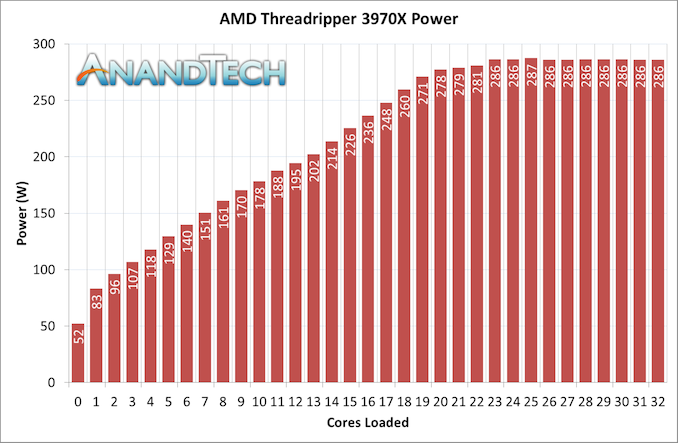








245 Comments
View All Comments
MarkusB. - Tuesday, November 26, 2019 - link
I dont think and I dont hope that Intel is dead here. I do love the current status to be honest. Let them fight on the same level. I dont care if I use a AMD or an Intel chip at the end of the day. Let the CPUs get cheaper and more powerfull with a nice and working competition :) ... Intel will react on this and maybe in a few years Intel is back, just to be chased again by AMD. THAT´s how it should be ;)azfacea - Tuesday, November 26, 2019 - link
intel won in 2005 because GloFo (part of amd then) couldnt keep up. now its reverse with TSMC. intel is dead for goodZizo007 - Tuesday, November 26, 2019 - link
My last Intel was the 4770K which was a great CPU. Nowdays AMD is dominating CPU performance and I am very happy with my 4Ghz 1800X. I saw no reason to upgrade the 4770K until Ryzen has launched. Intel will catch up but this might take a year or two. Intel won't be out of business for sure and that would be bad for us since AMD will raise their prices if there is no competition. In the other hand Intel is entering the GPU market which will help them. AMD is currently suffering in the GPU market as they only have the 5700XT which cannot keep up with the RTX series and Big Navi needs a miracle to even match the old Turing architecture; Big Navy won't even be released this year.Dr. Denis - Tuesday, November 26, 2019 - link
It would be nice if AMD released an entry level TR3 with 16 cores at the $900-$1000 price point. It would be like a 3950x but with the extra memory bandwidth and pcie lanes, which are really important in a variety of workloads. I think the reason why this configuration doesn't exist yet is because AMD has "Ryzen" the HEDT bar to high making the market for it too small. What do you think?azfacea - Tuesday, November 26, 2019 - link
pointless product. if you are building a 3000 usd workstation you can afford 1400. if you just want pcie lanes, there are some older gen thread rippers out there for 200 usd. AMD should focus on rolling out 2 -- and not 1 -- 7nm APU dies. one quad core for 15w and below and a 8 core apu for 15 inch laptops and larger, 25W+Dr. Denis - Tuesday, November 26, 2019 - link
Well... The APU market is another story since its the only place where AMD is still behind Intel in efficiency, and consequently, in performance. We all expect zen2 will revert this in 2020.Back to the workstation side, it seems now that the best option for a ~16 core system for memory bound applications is the good old Skylake
CyrIng - Tuesday, November 26, 2019 - link
Thank you AnandTech for this review.Talking about HEDT processing, why don't include Linux benchmark results ? Do games scores make a difference for a super computer...
Samus - Wednesday, November 27, 2019 - link
I need this to decompress my torrents. I'm tired of waiting 10 seconds for a bluray to extract and would rather wait 4 seconds...it's movie time!335 GT - Wednesday, November 27, 2019 - link
AMD's biggest problem now is making enough of these. Every EPYC is sold before it leaves the fab and I suspect the same is happening with the desktop chips.ballsystemlord - Wednesday, November 27, 2019 - link
No spelling or grammar errors found! Nice work, guys!